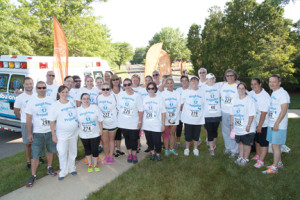By Judy O’Gorman Alvarez
HOLMDEL – Among the 340 runners and walkers who turned out for the Bayshore Community Hospital for the second annual 5k Run/Walk & Community Day on Saturday, June 28, were a group of 35 enthusiastic, and some might say, unlikely entrants.
The participants, all part of the hospital’s Center for Bariatrics ongoing patient-run support group, have had bariatric surgery. The 5k is part of their continued commitment to staying fit, active and healthy.
“I never thought I’d be able to do this,” said Steven Reed, who ran his first 5k. “I felt awesome.”
Reed, who lost 70 pounds since his surgery in February and has embarked on a life of fitness, finished the 5k in 40 minutes. “I was so excited, I did so well.”
Although he had trained at the gym on the treadmill, the experience of a race, surrounded by family, friends and fellow runners, brought about a new source of energy.
“Everyone was so excited. Everyone was so elated,” Reed said. “Some people were there to race and win the money. All we wanted to do was finish.”
As with all of the patients asked, Reed’s decision to have bariatric surgery came after years of exhausting weight loss measures, serious research and consideration and increasing health issues.
Since losing the weight, Reed has been trying to eat right and exercise, going to the gym.
“When I started to run, I realized ‘I can do this without dying,’ and it helped me lose the weight.
“Now I have so much energy,” Reed said.
He said he started monitoring his heart rate while exercising and saw an improvement.
“I noticed I recover quicker and, the best part of all, is I’m off all medication,” said Reed who was being treated for diabetes, hypertension and a host of other ailments.
While he felt he got to know his fellow support group members from meetings and lectures and trading tips and suggestions in the doctor’s waiting room, joining in an activity, like the 5k, was even better. “It was nice to be out there and do something together.
“I’d do it again … maybe even a marathon one day,” Reed said. “Having the hospital right here was kind of comforting.”
The Saturday race wasn’t Samantha Ross’ first 5k. She’s been slowly building up her collection of race T-shirts since her surgery a year and half ago gave her back the energy she once had.
“I used to take so many naps,” said Ross, who has lost 106 pounds since surgery. “Now I feel like I can take on the world.”
Ross, who struggled with her weight through childhood and most of her life, never thought she could run – for fitness or for fun. Her cousin’s successful bariatric surgery inspired her to come to the center.
“It has a family feel here,” Ross said about the center, which provides psychiatric and nutritional counseling.

–Photo courtesy Randy Allen for Meridian Health
In the weeks leading up to the Community Heart & Sole 5k, Matthew LeMaitre, M.D., of Monmouth Bariatrics, urged and cajoled 35 patients in the support group to lace up their sneakers and sign up.
“They did well,” he said. “Some of them looked surprisingly well after completing the 5k.”
In addition to being an achievable fitness challenge for his patients, LeMaitre said he hoped participation would inspire something else. “What I envision is that we’ll have our own race,” he said.
“There are 120 million people affected by obesity,” he said, which is the underlying reason for so many illnesses, including diabetes, heart disease, hypertension, infertility, arthritis, cancers, liver disease and many deaths.
“I feel obesity is something people aren’t talking about,” said the surgeon, who has run four marathons but does not run regularly now. “It has to do with shame and stigma surrounding the disease.”
LeMaitre said that obesity, like many diseases, go through a cycle when society blames the patient. After a while people get comfortable with the topic, such as breast cancer and HIV, “then it becomes OK to do a march for it and raise money and money goes into research and people stop dying from it.
“When it affects 120 million people, it’s not just a personal discipline problem,” he said.
The strides made in bariatric surgery has allowed for an improved, surgical solution for morbid obesity, he said.
“We walk for so many causes and diseases, we should walk to end obesity.”














